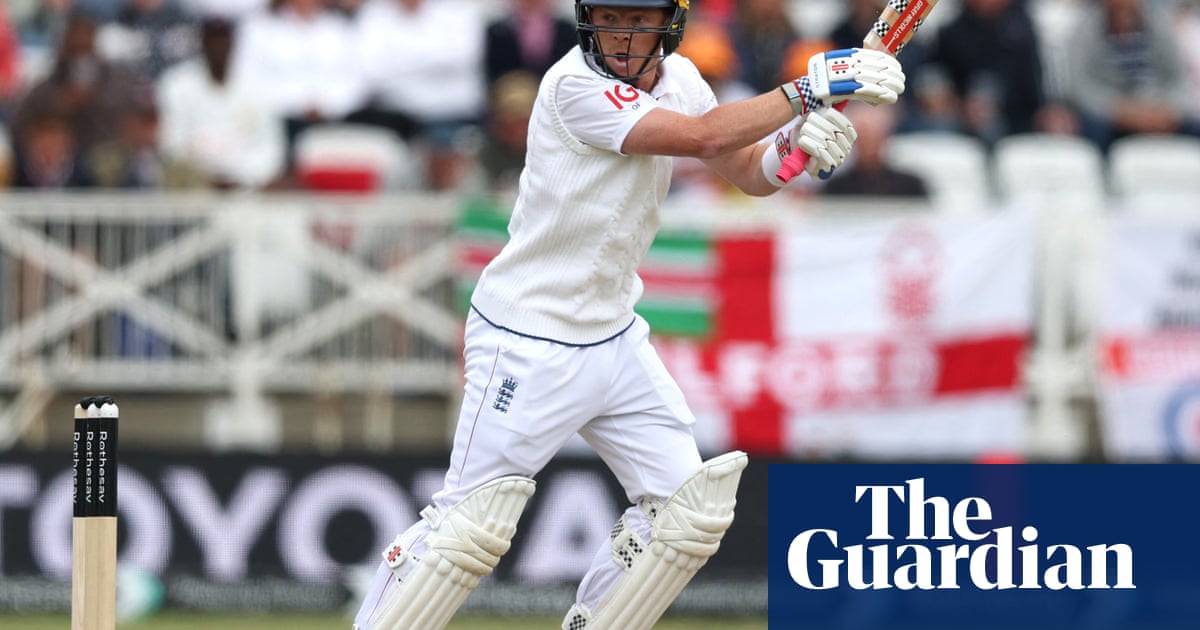ATest match that began with England saying they wanted to be better at media interactions and show a touch more humility ended with the captain growling about his words being twisted. And they say a week is a long time in politics …
It was my question that sparked all this, as it happens. The day before the one-off Test against Zimbabwe, I asked Ben Stokes about Jacob Bethell, the conversations that surrounded his absence to play in the Indian Premier League, and whether, as the “incumbent No 3” who made such an impression in New Zealand, he would be “straight back in” for the series against India.
That this referred to the playing XI felt implicit, and when Stokes talked up Bethell and told those present to put “two and two together”,so too did an instant return. But Stokes also went on to praise James Rew, the spare batter in Nottingham, and in his mind this made it perfectly clear he was referring to Bethell returning to the squad. Not that the word “squad” was ever used.
An honest mix-up, therefore, and not, as Stokes claimed after the victory,a deliberate misinterpretationdesigned to heap pressure on Ollie Pope. Besides, with England having played Bethell at No 3 for the entire New Zealand series, keeping Pope behind the stumps even after a spare wicketkeeper arrived on tour, debate around that position was pretty inevitable.
Pope was a lot more chilled about all this come the end of the Trent Bridge Test, a slick 171 during England’s 565 for six declared – and yet more cat-like reflexes at short leg – no doubt helping. While acknowledging a combined Test average of 22 against India and Australia, this year’s big boss opponents, is slightly suboptimal, the vice-captain fancies he has come on a bit since.
“I completely own that my numbers aren’t good enough against those guys, and I accept that,” Pope said. “But I think I am a better player. Hopefully over the next year I can prove that. I did that a little bit in India last year [a match-winning 196 in Hyderabad] but I look forward to doing it this summer and winter.
“It will be good to have [Bethell] back in the squad. The selectors can make their decision and I will try to score my runs.”
It is very England these days that competition for a player with eight Test centuries should come from a player yet to score one in senior cricket. But in Bethell they see a talent who is arguably more suited to the international game, where batters are tested by higher pace and more regularly on the back foot than in the County Championship. Those three half-centuries in New Zealand, including a near-miss 96, gave a taste of his suitability.
The difference between the two levels is also being shown by Shoaib Bashir, whose nine-wicket Test – even factoring in the quality of opposition – continued a divergence from his county numbers. In 14 outings for Somerset and his various loan sides, Bashir has taken 18 wickets at an average of 85. In 16 Tests the 21-year-old now has 58 wickets at 36 and takes one every 58 balls – a strike rate that is better than Graeme Swann (60.1) or Moeen Ali (61.8).
Sign up toThe Spin
Subscribe to our cricket newsletter for our writers' thoughts on the biggest stories and a review of the week’s action
after newsletter promotion
Not that anyone is claiming that Bashir has reached their level just yet. By his own admission, Bashir still takes time to settle into spells and his accuracy – something that will only be grooved by repetition – is a work in progress. But as Stokes noted after the win (words that could not be misinterpreted), Bashir is now beginning to challenge both sides of the right-hander’s bat. “We know that we’ve got a very special talent,” he said.
Looking ahead to India, a greater uncertainty is the make-up of the seam attack (even if rotation will blur the pecking order); not just how Brydon Carse slots back into it after his breakout winter but whether Sam Cook can hold his spot as the new ball specialist given Chris Woakes’s summer is now belatedly under way. Figures of one for 119 across 31 overs from Cook may have further cemented England’s view of Test cricket being a very different beast to the Championship.
It would be pretty harsh to judge Cook on the basis of one outing and a ground that is notoriously high-scoring. The surface at Trent Bridge, and the success of Bashir, also pointed to how dry the English season has been so far. As one reader pointed out below the line on Saturday, a continuation could make the Bazballers versus India’s spinners the key battle.
There is just under a month for all this to work itself out before the first Test at Headingley, with attention now switching to six white-ball internationals against West Indies that start on Thursday and Harry Brook’s first outing as the permanent limited-overs captain. If the first week of the Test summer is anything to go by, there is unlikely to be a shortage of talking points.
